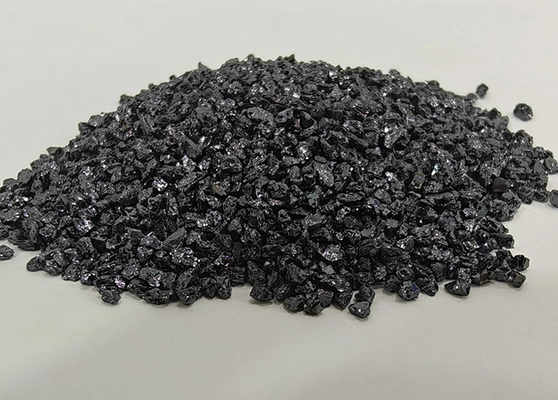Quick Answer
Silicon carbide (SiC) is one of the most versatile and durable industrial materials. It is widely used across multiple industries—including abrasives, refractories, metallurgy, ceramics, and semiconductors—thanks to its exceptional hardness, thermal conductivity, and chemical stability. At CanAbrasive, we manufacture and supply high-purity black and green SiC grains and powders tailored for grinding, polishing, blasting, and high-temperature processes worldwide.
Table of Contents
- Abrasives Industry
- Refractory Industry
- Metallurgical Additives
- Ceramic Industry
- Semiconductor & Power Electronics
- Automotive & Aerospace Applications
- FAQ
Abrasives Industry
Silicon carbide is best known as one of the world’s most effective abrasives. With a Mohs hardness of 9.2–9.5, it easily cuts and polishes hard materials like metals, ceramics, glass, and stones. SiC’s sharp, angular crystalline structure allows continuous self-sharpening during use, maintaining high grinding efficiency and consistent surface finishes.
At CanAbrasive, we produce both black silicon carbide (97–99% purity) for general grinding and cutting, and green silicon carbide (≥99% purity) for fine polishing and lapping. Our SiC abrasives are available in FEPA, JIS, and ANSI grit sizes for bonded wheels, coated abrasives, and blasting media. Due to its toughness and heat resistance, silicon carbide outperforms conventional aluminum oxide in applications that demand fast cutting and long tool life.
Refractory Industry
Refractories must withstand extreme heat and chemical attack, and silicon carbide excels in this environment. SiC is used in kiln furniture, crucibles, blast furnace linings, and combustion chambers, offering superior thermal shock resistance and structural integrity up to 1800°C. Its high thermal conductivity ensures uniform temperature distribution, while its low thermal expansion reduces cracking and spalling.
CanAbrasive’s SiC refractory grades feature controlled particle sizes and minimal impurities, ensuring excellent performance in both oxidizing and reducing atmospheres. These properties make SiC a preferred material for energy-efficient furnaces and long-lasting refractory linings in steel, glass, and non-ferrous metal industries.
Metallurgical Additives
In metallurgy, silicon carbide serves as both a deoxidizing and carburizing agent. When added to molten iron or steel, SiC releases carbon and silicon uniformly, improving fluidity, purity, and strength. It helps refine grain structures and reduce the need for other costly alloying elements.
CanAbrasive provides metallurgical-grade silicon carbide granules with stable chemical composition and excellent dissolution rates. They are commonly used in foundries and steel plants to enhance product quality and minimize slag formation. Our SiC-based additives are available in various particle sizes to meet specific furnace and ladle practices.
Ceramic Industry
Silicon carbide ceramics combine lightweight structure with extraordinary hardness and heat resistance. They are widely used in mechanical seals, wear-resistant parts, kiln supports, and ballistic armor. Compared to alumina, SiC ceramics offer better thermal shock resistance and higher strength-to-weight ratios.
At CanAbrasive, we supply fine SiC powders for sintered ceramics, reaction-bonded SiC (RB-SiC), and pressureless sintered SiC (SSiC). These powders are produced with narrow particle-size distributions and high purity, ensuring excellent densification and mechanical strength. SiC ceramics derived from our materials are used in pumps, valves, and high-temperature structural applications across chemical and defense industries.
Semiconductor & Power Electronics
Beyond structural applications, silicon carbide has become a cornerstone material in modern power electronics. SiC semiconductors outperform traditional silicon components by offering higher voltage tolerance, faster switching speeds, and superior efficiency. These properties make SiC indispensable for high-power devices such as inverters, converters, and electric vehicle (EV) systems.
CanAbrasive supports this fast-growing sector with ultra-fine, high-purity SiC powders suitable for wafer production, polishing, and thermal substrates. Our materials enable stable crystal growth and precision surface finishing in semiconductor-grade applications. As the demand for renewable energy and EV powertrains rises, SiC’s role in efficient energy conversion will continue to expand rapidly.
Automotive & Aerospace Applications
Silicon carbide plays a key role in both automotive and aerospace innovation. In electric vehicles, SiC is used in traction inverters, battery systems, and braking components—reducing energy loss and increasing driving range. SiC’s thermal stability and low weight make it ideal for high-speed, high-efficiency designs.
In aerospace, SiC components and coatings withstand extreme temperatures and stress. SiC-reinforced composites are used in turbine blades, heat shields, and ceramic matrix composites (CMCs) for jet engines. These materials maintain structural integrity even under thermal shock and corrosive gases. CanAbrasive’s SiC powders and grains help manufacturers achieve precision, strength, and reliability in demanding aerospace environments.
FAQ
What industries use silicon carbide?
Silicon carbide is used in abrasives, refractories, metallurgy, ceramics, semiconductors, automotive, and aerospace industries. It serves as a grinding medium, structural ceramic, metallurgical additive, and semiconductor substrate.
What makes silicon carbide superior to other materials?
SiC’s combination of extreme hardness, thermal stability, and chemical resistance enables it to outperform traditional materials like alumina and steel in high-temperature and high-wear environments.
What types of silicon carbide does CanAbrasive supply?
CanAbrasive offers black and green silicon carbide in macro and micro sizes, covering FEPA F12–F220 and JIS 240–3000 grit. We also supply customized metallurgical-grade SiC granules and fine powders for advanced ceramics and semiconductors.
Can silicon carbide be recycled or reused?
Yes. SiC abrasives and powders can often be reclaimed and reprocessed, especially in blasting or polishing systems, depending on particle size retention and contamination levels.
Why choose CanAbrasive as your silicon carbide supplier?
With decades of experience in abrasive manufacturing, CanAbrasive ensures consistent quality, international standards compliance (ISO/FEPA/JIS), and global logistics support. Our SiC materials are trusted by distributors and end-users across Asia, Europe, and the Americas.
Contact CanAbrasive today to request a quote or technical data sheet for high-purity silicon carbide abrasives, powders, or metallurgical grades.
